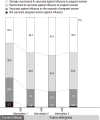Perception and Attitudes of Korean Obstetricians about Maternal Influenza Vaccination
- PMID: 27366003
- PMCID: PMC4900997
- DOI: 10.3346/jkms.2016.31.7.1063
Perception and Attitudes of Korean Obstetricians about Maternal Influenza Vaccination
Abstract
Pregnant women are prioritized to receive influenza vaccination. However, the maternal influenza vaccination rate has been low in Korea. To identify potential barriers for the vaccination of pregnant women against influenza, a survey using a questionnaire on the perceptions and attitudes about maternal influenza vaccination was applied to Korean obstetricians between May and August of 2014. A total of 473 respondents participated in the survey. Most respondents (94.8%, 442/466) recognized that influenza vaccination was required for pregnant women. In addition, 92.8% (410/442) respondents knew that the incidence of adverse events following influenza vaccination is not different between pregnant and non-pregnant women. However, 26.5% (124/468) obstetricians strongly recommended influenza vaccination to pregnant women. The concern about adverse events following influenza vaccination was considered as a major barrier for the promotion of maternal influenza vaccination by healthcare providers. Providing professional information and education about maternal influenza vaccination will enhance the perception of obstetricians about influenza vaccination to pregnant women and will be helpful to improve maternal influenza vaccination coverage in Korea.
Keywords: Influenza Vaccines; Maternal Welfare; Pregnant Women.
Conflict of interest statement
Figures

References
-
- Jamieson DJ, Honein MA, Rasmussen SA, Williams JL, Swerdlow DL, Biggerstaff MS, Lindstrom S, Louie JK, Christ CM, Bohm SR, et al. H1N1 2009 influenza virus infection during pregnancy in the USA. Lancet. 2009;374:451–458. - PubMed
-
- Vaccines against influenza WHO position paper - November 2012. Wkly Epidemiol Rec. 2012;87:461–476. - PubMed
-
- Kim MJ, Lee SY, Lee KS, Kim A, Son D, Chung MH, Park SG, Park JH, Lee BI, Lee JS. Influenza vaccine coverage rate and related factors on pregnant women. Infect Chemother. 2009;41:349–354.
MeSH terms
Substances
LinkOut - more resources
Full Text Sources
Other Literature Sources
Medical

